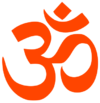Religion:Prayer in Hinduism
| Part of a series on |
| Hinduism |
|---|
 |
Prayer (Sanskrit: प्रार्थना, romanized: prārthanā) is considered to be an integral part of the Hindu religion; it is practiced during Hindu worship (puja) and is an expression of devotion (Bhakti). The chanting of mantras is the most popular form of worship in Hinduism. The Vedas are liturgical texts (mantras and hymns). Stuti is an umbrella term for religious literary creations, but it literally means "praise."
The Hindu devotional Bhakti traditions place a focus on repetitive prayer, known as japa. Prayer is centred on the personal forms of gods and goddesses, such as Vishnu's avatars, most notably Rama and Krishna, Shiva, or Shiva's sons such as Kartikeya and Ganesha, as well as Mahadevi, the supreme goddess, and her forms, such as Lakshmi or Kali.
The human aspire to the highest truth, the underlying monism of Hinduism, pertaining ultimately to the one Brahman, began before the ritual process, before the invocation of diverse deities for the fulfilment of varied needs. The Gayatri Mantra was part of all Vedic ceremonies and is still invoked in Hindu temples all over India and other countries around the world today, exemplifying its essence.
Bhakti yoga
This section does not cite any external source. HandWiki requires at least one external source. See citing external sources. (August 2021) (Learn how and when to remove this template message) |
Described in the Bhagavad Gita, bhakti yoga is the path of love and devotion. On bhakti yoga:
".... those who, renouncing all actions in Me, and regarding Me as the Supreme, worship Me... of those whose thoughts have entered into Me, I am soon the deliverer from the ocean of death and transmigration, Arjuna. Keep your mind on Me alone, your intellect on Me. Thus you shall dwell in Me hereafter."—Bhagavad Gita, Chapter 12, Verses 6-8
It is essentially the process of enlightenment found through worship of the Devas (or Devi, the feminine form of Deva), in whatever form one envisions. Prayer is achieved through puja (worship) done either at the family shrine or a local temple. We can see from Krishna's injunction that prayer is fundamental to Hinduism, that to dwell constantly on the Divine is key to enlightenment. Prayer repetition (through mantras) using malas (Hindu prayer beads) are a strong part of Hinduism.
The devotionalist Bhakti movement originates in South India in the Early Middle Ages, and by the Late Middle Ages spread throughout the subcontinent, giving rise to Sant Mat and Gaudiya Vaishnavism.[1]
Mantras
Gayatri mantra
The Gayatri mantra is Hinduism's most representative prayer. Many Hindus recite it on a daily basis, not only contemplating its straightforward meaning, but also dwelling on and imbibing its sound, regarded to be pregnant with spiritual meaning. For this reason nearly all Hindu prayers and mantras are sung. The Gayatri mantra was first recorded in the Rigveda[lower-alpha 1] which was composed in Sanskrit about 2500 to 3500 years ago, and by some reports, the mantra may have been chanted for many generations before that.[2]
|
|
|
Perspectives
Mahatma Gandhi stated that:
"Prayer is the very soul and essence of religion, and therefore prayer must be the very core of the life of man."[3]
See also
- Jangam
Notes
- ↑ Rigveda 3.62.10
References
Bibliography
- Agrawal, Avadhesh (May 2012). Throw Away Your Thoughts and Change Your Life: A Spiritual Journey. AuthorHouse. ISBN 9781456743949. https://books.google.com/books?id=VZt0XzEgLKUC&q=composed+in+Sanskrit+about+2500+to+3500+years+ago%2C+and+by+some+reports%2C+the+mantra+may+have+been+chanted+for+many+generations+before+that.&pg=PA176.
- Gandhi, Mohandas Karamchand (1999). "Speech at Prayer Meeting, Sabarmati Ashram". The collected works of Mahatma Gandhi (electronic book). 48. New Delhi: Publications Division Government of India. p. 242. http://www.gandhiserve.org/cwmg/cwmg.html.
- Beck, Guy L. (2006). Sacred Sound: Experiencing Music in World Religions. Wilfrid Laurier University Press. p. 118. ISBN 978-0-88920-421-8. https://books.google.com/books?id=t-IeHbqAfSsC&pg=PA118.
- Swami Omkarananda. "How to Pray". http://www.omkarananda-ashram.org/Publications/how_to_pray.htm.
- Shakun Narain Kimatrai. "Healing Prayers & Mantras - Sanskrit & Hindi". http://www.dalsabzi.com/Mantras/mantras_intro.htm.
- Jayaram V. "Hinduism and Prayers". https://www.hinduwebsite.com/hinduism/h_prayers.asp.
 |

